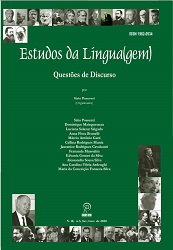A noção de competência (inter)discursiva como articulador teórico entre fenômenos de ordem ideológica (interdiscurso) e cognitiva (pré-discurso) (The notion of (inter)discursive competence as the theoretical articulator between concepts of an ...)
DOI:
https://doi.org/10.22481/el.v18i3.7950Palavras-chave:
Análise do Discurso; Dimensão cognitiva do discurso; Interdiscurso; Pré-discurso; Competência (inter)discursiva.Resumo
Neste artigo, pretendo demonstrar a produtividade de se articular em uma teoria do discurso dois conceitos de naturezas distintas – um de natureza ideológica, outro de natureza cognitiva. Mais especificamente, pretendo demostrar a viabilidade de articular os conceitos de interdiscurso (MAINGUENEAU, 2008) e pré-discurso (PAVEAU, 2013), assumindo a noção de competência (inter)discursiva (MAINGUENEAU, 2008) como o grande articulador teórico que permite associar, de maneira congruente, esses dois conceitos. Uma das contribuições do artigo será demonstrar a produtividade de se construírem pontes entre uma teorização sobre o discurso fundamentada na relação entre língua e história e uma teorização sobre o discurso que incorpora, na explicação de seu funcionamento, uma dimensão cognitiva.
Downloads
Referências
FLOR, Nick, HUTCHINS, Edwin. Analyzing distributed cognition in software teams: a case study of team programming during perfective software maintenance. In: Proceedings of the fourth annual workshop on empirical studies of programmers. Norwood, N. J. Anais... Norwood, N. J: Ablex Publishing, 1991. p. 36–59
HUTCHINS, Edwin. Cognitive artifacts. 2002. Disponível em: http://ato.ms/MITECS/Entry/boster.html . Acesso em: 11 fev., 2017.
MAINGUENEAU, Dominique. Gênese dos discursos. 2. ed. Trad. S. Possenti. São Paulo: Parábola, 2008. (Título original: Genèses du discours, 1984)
MARTINS, M. H. (Org.). Questões de linguagem. São Paulo: Contexto, 1991.
NORMAN, Donald. Cognitive artifacts. In: CARROLL, John Millar (org.). Designing Interaction: psychology at the human-computer interaction interface. New York: Cambridge University Press, 1991.
PAVEAU, Anne-Marie. Os pré-discursos: sentido, memória, cognição. Trad. G. Costa, D. Massmann. Campinas: Pontes, 2013. (Título original: Les prédiscours. Sens, mémoire, cognition, 2006).
PÊCHEUX, Michel. O discurso: estrutura e acontecimento. Campinas: Pontes, 1990. (Título original: Discourse: structure or event?, 1983).
Downloads
Publicado
Como Citar
Edição
Seção
Licença
Copyright (c) 2020 Estudos da Língua(gem)

Este trabalho está licenciado sob uma licença Creative Commons Attribution 4.0 International License.
Autores que publicam em Estudos da Língua(gem) concordam com os seguintes termos:
Estudos da Língua(gem) mantém os direitos autorais das contribuições publicadas e disponibiliza seu conteúdo gratuitamente por meio do portal. Autores têm permissão e são estimulados a publicar e distribuir seu trabalho online em repositórios institucionais ou na sua página pessoal, com reconhecimento de autoria e créditos de publicação inicial nesta revista, indicando endereço online.






